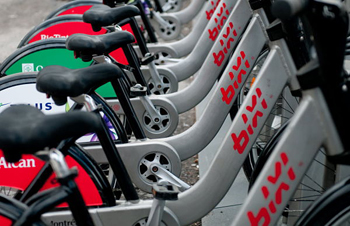|
A few weeks ago, as
the employees of Montreal’s bike-sharing program put the sturdy bicycles
in storage for another winter, the city’s mayor was inviting citizens’
input on the future of the money-losing venture, and speculation swirled
over whether the city would finally pull the plug on Bixi.
A massive
$108-million bailout in loans and loan
guarantees approved by the city in 2011 had not been enough to rescue
the troubled company and in August, a judge formalized the transfer of
the Public Bike System’s assets to a new, city-owned non-profit, Bixi
Montreal. Taxpayers took possession of 5,120 bicycles and 461 automated
rental stations without any further discussion.
 But when it was
announced that continuing to operate the service until 2019 would cost
the city another $3 million per year, even former supporters could have
been forgiven for balking. In 2011, I said Bixi was “too cool to fail,”
but I thought I might be proven wrong. But when it was
announced that continuing to operate the service until 2019 would cost
the city another $3 million per year, even former supporters could have
been forgiven for balking. In 2011, I said Bixi was “too cool to fail,”
but I thought I might be proven wrong.
I should have had
more faith. Leadership demands fortitude, so on November 24,
Mayor Denis Coderre announced that the
city was renewing the contract.
The Montreal
Gazette cheered the decision, dismissing the concerns of naysayers.
If the city were to discontinue the bike-sharing service,
one
editorialist wrote:
“the almost $40
million Montreal has pumped into the venture in loans and other bailouts
would [be] money down the drain, and those clunky grey bikes and hulking
stands would be left to gather cobwebs.”
Whether this fine example of the “sunk costs” fallacy was one of Coderre’s
reasons for keeping the grey-coloured white elephant in the city’s
enormous menagerie, no one can say. The reasons
he expressed were…
typically compelling:
“Bixi is part of the signature of Montreal,” said the mayor. “Our
engagement today supports the non-profit organization, because it
represents part of our efforts to position Montreal as a leader in
public and alternative modes of transit, for the benefit of all
Montrealers.”
|
|
“In October, the Mineta
Transportation Institute at San Jose State University
published a detailed report on bike-sharing programs across
North America, including Bixi, which clearly demonstrated
that the programs cater disproportionately to the rich.” |
|
In any case, he added, the costs would only amount to 77 cents per
citizen per year. Also, there will be more transparency in Bixi’s
operations, something which has been promised on other occasions.
Does Bixi benefit all Montrealers? Not really. In October, the Mineta
Transportation Institute at San Jose State University published
a
detailed report on bike-sharing programs across North America, including Bixi,
which clearly demonstrated that the programs
cater disproportionately to the rich.
Why is that? The report identifies two major reasons: Fewer bike
stations are located in low-income neighbourhoods, and the systems
typically require a credit card for rentals.
Supporters tend not to emphasize this aspect of the operation,
preferring to focus on its ecological benefits.
Bixi Montreal is currently looking into the feasibility of accepting
Opus metro-pass cards (no doubt at a major cost for retrofitting the 461
stations), but Bixi will probably remain a curiosity for low-income
Montrealers, who will continue to pay for it regardless.
The same study does indicate that users of bike-sharing programs report
driving less, which is no doubt a good outcome, but one that might be
arrived at more cheaply at this point by simply buying every citizen who
wants one his or her own bicycle.
Years ago, a friend remarked that Bixi was misnamed. The word was
supposedly formed by combining BIcycle with taXI. The
other way of combining them is more reflective of what they actually
are: taxcycles.
|
|
|
From the same author |
|
▪
Uber Über Alles: The Internet Is Killing Regulated
Business
(no
323 – June 15, 2014)
▪
The Luddite Fallacy Is Alive and Well
(no
317 – December 15, 2013)
▪
The Pros and Cons of Discrimination
(no
316 – November 15, 2013)
▪
Amazon: The Bad, the Ugly, and the Good
(no
315 – October 15, 2013)
▪
The Booksellers' Petition
(no
314 – Sept. 15, 2013)
▪
More...
|
 |
|
First written appearance of the
word 'liberty,' circa 2300 B.C. |
|
Le Québécois Libre
Promoting individual liberty, free markets and voluntary
cooperation since 1998.
|
|

